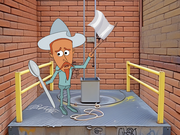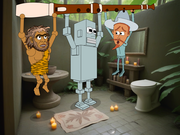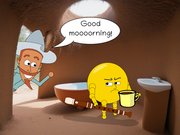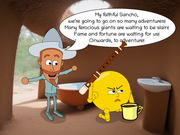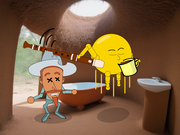Pinyin initial: "d"
The Pinyin initial "d" is used in the first half of Pinyin syllables. In MandarinBanana's mnemonic system, "d" belongs to the group of Pinyin initials which are represented in mnemonics by men. You can visit the Pinyin index to see all Pinyin syllables from this mnemonic group, or to see all Pinyin syllables "d" can appear in.
Mnemonics for d
Characters with d
of; ~'s (possessive particle) / (used after an attribute) / (used to form a nominal expression) / (used at the end of a declarative sentence for emphasis) / also pr. [di4] or [di5] in poetry and songs
big; large; great / older (than another person) / eldest (as in 大姐[da4 jie3]) / greatly; freely; fully / (dialect) father / (dialect) uncle (father's brother)
dawn / morning / daybreak / day / dan, female roles in Chinese opera (traditionally played by specialized male actors)
旦
=
一
+
日
:
Mnemonic symbol: A big mug, since many people start the day with a mug of coffee.
Don Quixote (d) meets the sun (日) early in the morning (旦) in the anthill's bathroom (an4). Don Quixote is full of energy and can't wait to start into a new adventure, but since the sun is a morning grouch who only just started drinking her mug of coffee (mnemonic symbol for 旦) she cannot stand it and beats him over the head with a flute (一) to calm him a bit down.
Don Quixote (d) meets the sun (日) early in the morning (旦) in the anthill's bathroom (an4). Don Quixote is full of energy and can't wait to start into a new adventure, but since the sun is a morning grouch who only just started drinking her mug of coffee (mnemonic symbol for 旦) she cannot stand it and beats him over the head with a flute (一) to calm him a bit down.
-ly / structural particle: used before a verb or adjective, linking it to preceding modifying adverbial adjunct
knife / blade / single-edged sword / cutlass / CL:把[ba3] / (slang) dollar (loanword) / classifier for sets of one hundred sheets (of paper) / classifier for knife cuts or stabs
Kangxi radical 18 (刀[dao1]) as a vertical side element / see also 立刀旁[li4 dao1 pang2] / see also 側刀旁|侧刀旁[ce4 dao1 pang2]
to reach; to arrive / to leave for; to go to / to (a place); until (a time); up to (a point) / (verb complement indicating arriving at a place or reaching a point) / considerate; thoughtful; thorough
road / path / CL:條|条[tiao2],股[gu3] / principle / truth / morality / reason / skill / method / Dao (of Daoism) / to say / to speak / to talk / classifier for long thin things (rivers, cracks etc), barriers (walls, doors etc), questions (in an exam etc), commands, courses in a meal, steps in a process / (old) circuit (administrative division)
class / rank / grade / equal to / same as / to wait for / to await / et cetera / and so on / et al. (and other authors) / after / as soon as / once
等
=
⺮
+
寺
:
Inside of the engine, Don Quixote is praying in front of a Buddhist shrine. He brought a bamboo stick as offer, and he lighted it at the very top. Now he's waiting for the stick to burn down so he can go home. However, the stick is very long: Don Quixote will have to wait for a long time.
to obtain / old variant of 得[de2]
to have to / must / ought to / to need to
得
=
㝵
+
彳
:
Because Don Quixote kicked the genie's lamp from the rooftop of the Erechtheion as far as to inside of the Eiffel Tower, the genie demands Don Quixote to apologize. Inside of the Eiffel Tower, Don Quixote kowtows to the genie, who takes back the black sneakers he gave to Don Quixote earlier.
to obtain / to get / to gain / to catch (a disease) / proper / suitable / proud / contented / to allow / to permit / ready / finished
structural particle: used after a verb (or adjective as main verb), linking it to following phrase indicating effect, degree, possibility etc

